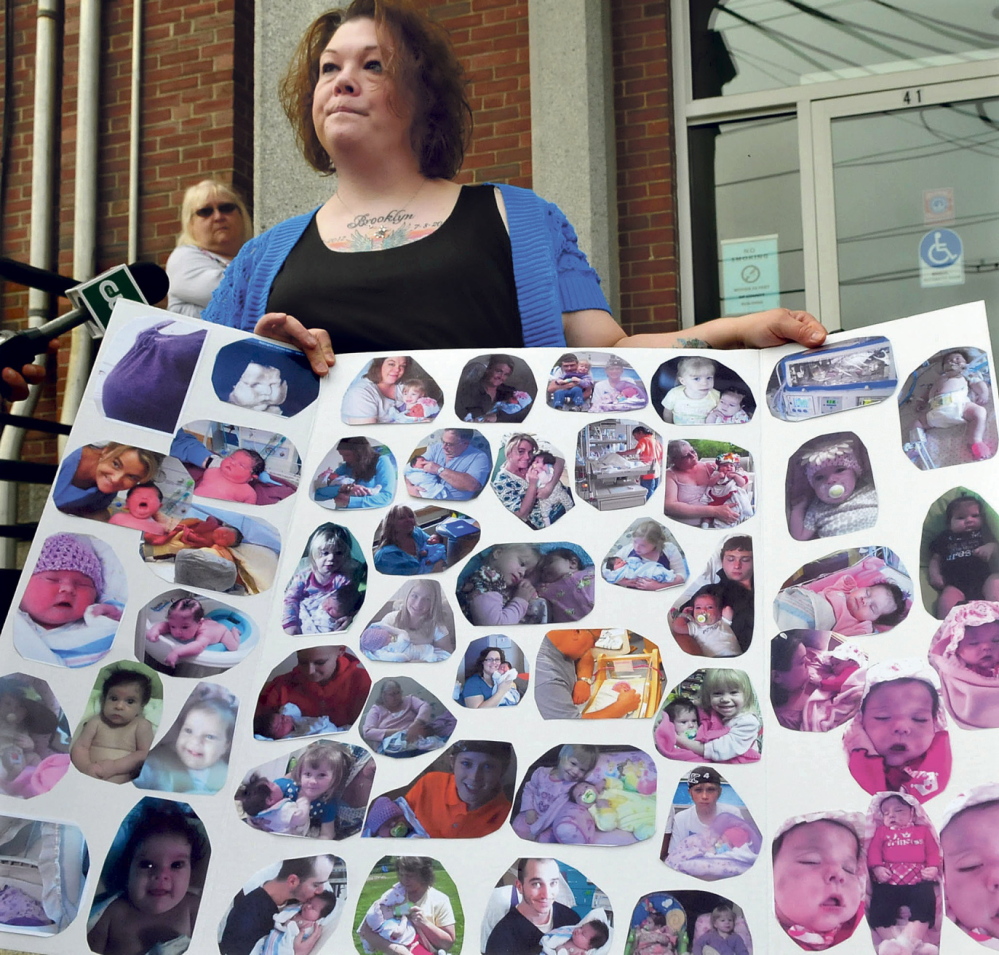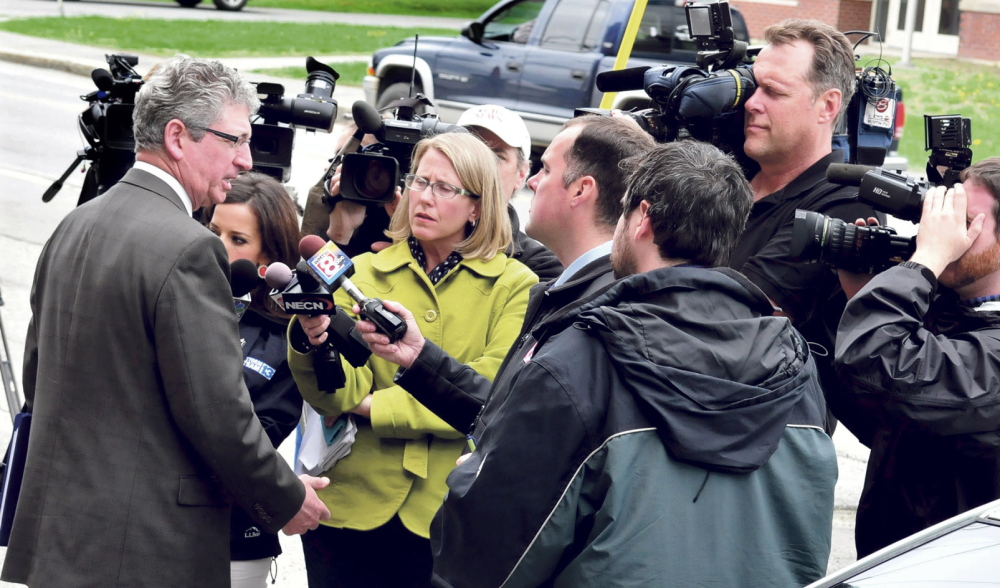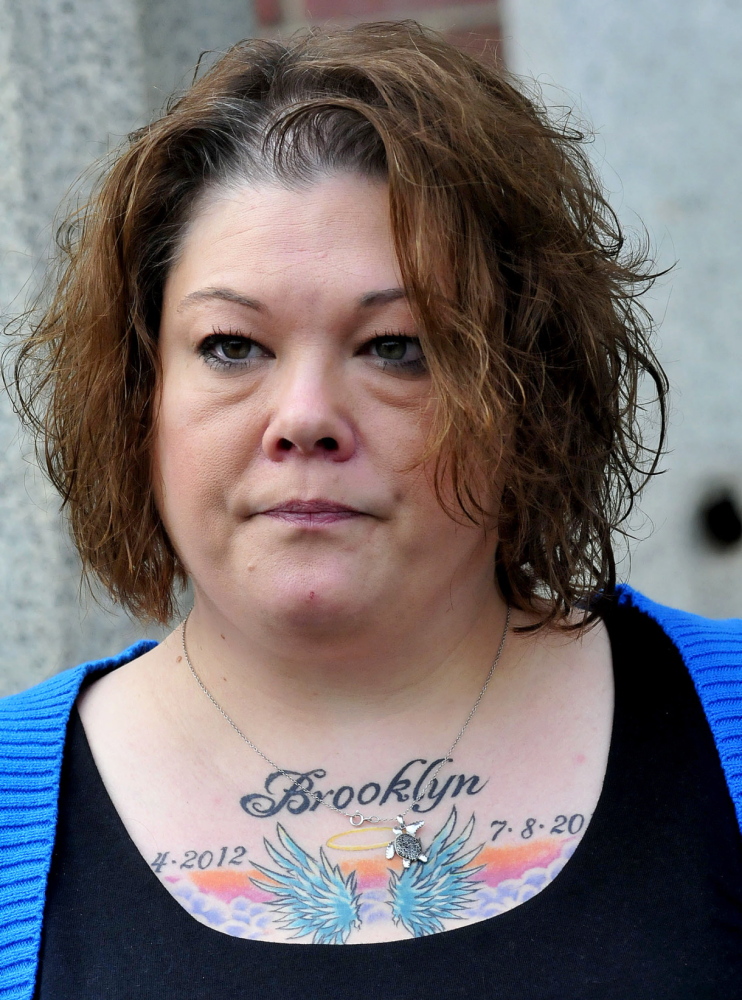SKOWHEGAN — A 12-year-old girl admitted in court Wednesday to unspecified juvenile charges in connection with the killing of a baby nearly two years ago and was sentenced to undergo court supervision and treatment, concluding a high-profile case that involved among the state’s youngest-ever manslaughter defendants.
Kelli Murphy, who was 10 at the time of the killing, was charged in the death of Brooklyn Foss-Greenaway, a 3-month-old who died while at the home of Murphy and her mother, Amanda Huard.
At the Skowhegan District Courthouse, Judge Charles LaVerdiere on Wednesday called the case a “tragedy” in accepting a plea deal crafted by prosecutors and Murphy’s defense attorney. The deal dropped the manslaughter charge against Murphy in exchange for an admission of guilt to multiple unspecified misdemeanor charges.
“I had a lot of anger,” Nicole Greenaway, mother of Brooklyn, said Wednesday after the case was resolved in a closed-door session. “I felt lots and lots of anger.”
Greenaway said she has hired a lawyer and intends to file a lawsuit against Murphy’s mother, Huard.
“It’s already in the works,” Greenaway said on the courthouse steps, holding a poster displaying dozens of pictures of Brooklyn, including some taken after the infant’s death. A foot-wide colorful tattoo also could be seen on Greenaway’s chest, bearing Brooklyn’s name, dates of birth and death, a halo and a set of angel wings.
Huard called 911 the night of July 8, 2012, to report that the baby was not breathing. Greenaway has said she was told that her daughter died from suffocation and trace amounts of a prescription medication in her system that matched medication Murphy, then 10 years old, was taking. Brooklyn was in a bedroom with Murphy at the time.
Citing state law for juvenile court cases, Deputy Attorney General Bill Stokes, the prosecutor, would not specify the new misdemeanor charges that replaced the manslaughter charge against Murphy. Stokes said the judge ordered Murphy to continue receiving counseling and treatment under supervision of the state Department of Health and Human Services.
When Murphy turns 18, the court will oversee an evaluation to determine whether the supervision period should be extended until Murphy is 21 years old.
As a juvenile defendant, Murphy did not plead guilty to the misdemeanors, but rather “admitted responsibility,” Stokes said.
Christopher Northrop, a clinical professor at the University of Maine School of Law and director of the law school’s Juvenile Justice Clinic, said dismissing the felony charge allowed the case to be resolved in a closed session.
“The defense attorneys were clearly looking to have this child not have a record open to the public, not have a proceeding open to the public,” Northrop said Wednesday. “This closes the proceedings and ensures that, as long as this girl doesn’t get into any additional trouble, that the case will be sealed when she turns 18.”
âIT’S NOT ABOUT PUNISHMENT’
In 2012, before Brooklyn’s death, Greenaway and Huard were friends and co-workers at Elmwood Primary Care in nearby Waterville. Greenaway said they hosted each other for barbecues and social visits and that she felt comfortable allowing Brooklyn to spend the night in Huard’s Fairfield home on July 8, 2012.
“I trusted her,” Greenaway said.
Housemates of Huard said that months before Brooklyn’s death, they had rushed a different baby to the hospital, where doctors treated her for a reaction to that same medication. That baby recovered, and the incident led to the involvement of the Department of Health and Human Services, but no criminal charges.
Murphy, who was taken into custody shortly after Brooklyn’s death, has been placed in a foster home, Stokes said.
In agreeing to dismiss the felony manslaughter charge, LaVerdierre said “that particular case is now closed.”
Before dismissing the charge, LaVerdierre explained that the state’s juvenile justice system, which is handling Murphy’s case, operates on a different set of rules than the adult justice system.
“It’s not about punishment,” he said. “It’s not about revenge. It’s not about making someone pay.”
Juveniles are given sentences with a goal of rehabilitation that will help them to become productive members of society, he said. LaVerdierre said that his goal in the proceedings was to achieve a measure of justice for the victim, the juvenile and for society.
“Despite the immense loss of a child, something good can come of it,” he said, “A juvenile who gets the services they need and gets the support they need to be a productive member of society.”
Even so, LaVerdierre acknowledged it’s not the “perfect answer to this case,” but said it’s “the best solution possible.”
Because proceedings involving misdemeanor charges against juveniles are not made public under Maine state law, he said the details of Murphy’s case would not be released.
“This is not to shield anybody or deny the public the ability to know,” he said. Keeping Murphy’s sentence private, he said, was a component of the rehabilitation process and would increase the chances of her treatment succeeding.
Murphy, Huard and Greenaway were all present during the open court session of Wednesday’s proceedings.
Murphy sat at a courtroom table with her attorneys at the defense table, acting much as she did during the last open court session in her case, in September 2012. She did not speak, and she looked at the floor while twisting her hands in her lap.
Her mother, Huard, sat about 15 feet to Murphy’s left; she entered and left the courtroom with a companion.
Greenaway sat in the front of the public seating area, her face distraught, holding hands with a man sitting to her left. A woman to her right gripped Greenaway’s upper arm in a show of support.
MOTHER MOVES FORWARD
After Wednesday’s hearing, Greenaway said she does not disagree with treatment ordered by the court and understands Murphy needs help.
But Greenaway said the manslaughter charge should not have been dismissed.
“She needs to have that label,” Greenaway said. “Not having that label makes me feel she got away with murder.”
Before the opening of court Wednesday morning, Greenaway stood on the steps of the courthouse, displaying the poster board and a framed photograph of Brooklyn. She expressed doubt that Murphy can be rehabilitated successfully.
“I personally think that she will do this again,” Greenaway said of Murphy. “I think she is on the path to being a sociopath.”
Greenaway has urged prosecutors to file charges against Huard, but the attorney general’s office says the law does not support any criminal charges against her.
“You’re talking about holding parents criminally responsible for the actions of their children,” Stokes said, explaining the decision not to bring charges.
Greenaway said she and Huard have never had a heartfelt discussion about what happened.
While she might have been receptive to an apology in the immediate aftermath of the tragedy, Greenaway said, the time for that has passed.
“They can’t say anything to bring my daughter back,” she said.
Greenaway said her family has been scarred by the loss of Brooklyn. Greenaway said she is receiving treatment for panic attacks and that her other daughter, 4-year-old Madison, has nightmares she associated with the incident.
Still, she said, the end of the case at least will end uncertainty that has dragged on for nearly two years.
“Maybe,” she said, “I can start moving forward.”
Matt Hongoltz-Hetling — 861-9287 | mhhetling@centralmaine.com | Twitter: @hh_matt
Send questions/comments to the editors.





Comments are no longer available on this story